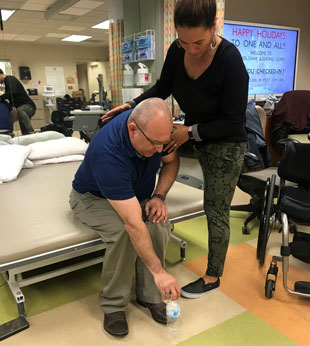Know Your Balance!
Individuals with spinal cord injury (SCI) experience immediate changes in balance ability and control as a result of the initial injury. These balance impairments are more severe for some than others, however, it affects all individuals with SCI to some degree.


Dr. Maya Hatch is working on a new project--balance and posture while seated. Obviously super important for people living with paralysis, and a potentially important measure for testing and quantifying recovery due to therapeutic interventions.
Individuals with spinal cord injury (SCI) experience immediate changes in balance ability and control as a result of the initial injury. These balance impairments are more severe for some than others, however it affects all individuals with SCI to some degree. Balance ability not only affects large motor tasks like standing and walking, but it also has a strong influence on everyday activities around the home such as dressing, eating, bathing, transfers and even wheelchair mobility.
Maya's research team recently performed pilot testing of a new balance outcome measure for individuals with SCI. This new outcome measure, called the Modified Function In Sitting Tests (or mFIST), is an adapted version of the original Function in Sitting Test (FIST) developed for use with people who have suffered strokes. Maya's team worked with Dr. Sharon Gorman, the creator of the FIST, to modify some of testing items for use in the SCI population. Then, with funding from the Paralyzed Veterans of America, they tested the initial reliability and validity of the mFIST on a cohort of Veterans with SCI at the Long Beach VA SCI/D Center.
Results from the first phase showed that reliability, or repeated accuracy across 2 appointments, of the mFIST on 46 Veterans with SCI was very high. Consistency of scoring between different clinical evaluators was also very high. In the second phase of her work, 20 Veterans who participated in the first phase were interviewed to get their thoughts and opinions about the mFIST. The majority (95%) thought the mFIST properly tested their balance ability, and the items and directions were clear. General thoughts about the mFIST included 45% indicating that the mFIST made them more aware of what their balance ability was, 35% thought it would be useful in the clinic, 10% said it confirmed their perceived balance ability and another 10% didn’t think it would be useful in the future. ALL of those interviewed (100%) believed in maintaining their balance, and that balance was an important part of their daily lives.
What makes the mFIST so unique is that the entire test can be performed while seated. This is in contrast to the existing and validated balance test in SCI, the Berg Balance Scale, where only 2 of the 14 items are performed while seated. As the name mentions, the mFIST tests the ability of one’s function while seated making it suitable for a much wider range of individuals with SCI. Testing items include functional activities like leaning to the side, reaching in front of you, reaching for an item behind you, and scooting to the side. There are also items that test your reactivity to an unexpected nudge.
Maya's team is very encouraged by the results from this study, and is already starting the next phase of studies related to this work that incorporates new 3D sensor technology, like the Microsoft Kinect 2, to track seated balance ability in a more rigorous and sophisticated fashion. These new studies will be performed by Dr. Hatch’s team at the Reeve-Irvine Research Center. Look out soon for more details on this study!


